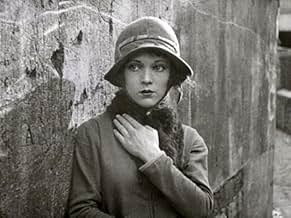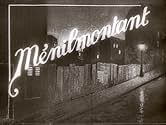Ménilmontant
- 1926
- 38m
IMDb RATING
7.8/10
2.9K
YOUR RATING
A couple is brutally murdered in the working-class district of Paris. Later on, the narrative follows the lives of their two daughters, both in love with a Parisian thug and leading them to ... Read allA couple is brutally murdered in the working-class district of Paris. Later on, the narrative follows the lives of their two daughters, both in love with a Parisian thug and leading them to separate ways.A couple is brutally murdered in the working-class district of Paris. Later on, the narrative follows the lives of their two daughters, both in love with a Parisian thug and leading them to separate ways.
- Director
- Writer
- All cast & crew
- Production, box office & more at IMDbPro
Featured reviews
After the violent and brutal death of their parents, two sisters leave to the big city to live. There, one of the sisters falls in love with a young man, but he is unfaithful and she is left having to deal with her own lost dreams and a baby without a job or a friend.
This is an interesting experimental film. It shows a lot more violence and sex than typically shown at the time, and yet it is very contemplative and serene in parts. However, as a subject of lost dreams, mostly it's very tragic. The image of interest here is the recurring motif of water. Water seems to provide all of the "insanity," including the boy seemingly coming from a spilt water barrel and a long montage of the woman contemplating something drastic as she looks out over the river.
It's powerfully affecting. It's strongest when hectic, during death or violence (beginning and end) or the sudden change from the serene quiet of the country to the speed and confusion of the city. It is a tragedy in every way, as lives are shattered in one way or another until a rather biting climax.
--PolarisDiB
This is an interesting experimental film. It shows a lot more violence and sex than typically shown at the time, and yet it is very contemplative and serene in parts. However, as a subject of lost dreams, mostly it's very tragic. The image of interest here is the recurring motif of water. Water seems to provide all of the "insanity," including the boy seemingly coming from a spilt water barrel and a long montage of the woman contemplating something drastic as she looks out over the river.
It's powerfully affecting. It's strongest when hectic, during death or violence (beginning and end) or the sudden change from the serene quiet of the country to the speed and confusion of the city. It is a tragedy in every way, as lives are shattered in one way or another until a rather biting climax.
--PolarisDiB
10sandover
Poverty, disillusion, and yet grace graces the screen when Nadia Sibirskaya nods to the old man who offers her some food to chew. That scene, that means her social grace, brought me tears and elated me at once - miracles, oh yes, do and do happen and move.
One should note that the old man does not reciprocate, in fact does not look at her at all, and this marks Kirsanoff's extraordinary finesse: if there was some kind of "communication" between the two, THIS would be melodramatic; for I do not think this film is a melodrama, at least the way we have come to mean one. To deny that the story is something that could have "happened", is to deny the film's class and émigré conscience.
On the other hand I am not sure I would claim, as another reviewer did, that this is Zola-like; we would then be a bit far from "Menilmontant"'s drastic, dislocated lyricism.
Watch the cutting close-ups the two times Sibirskaya's eloquent face witnesses a violent scene: the camera, a bit dislocated each time, and unafraid to jump and shut transitive seconds.
Watch the scene where she strongly contemplates something and starts descending the steps to the river: there is a sense of menace and imminent loss, I am not sure I ever witnessed before in a film: this is film-making on the heights; as is the camera work which frames hesitant feet on the steps, and hushes astonishingly their turning round.
Watch the protagonist's face after she arguably loses her virginity: inscrutable and fascinating, not allowing us truly tell if the vision of her wandering in the woods is one of innocence lost or burgeoning sexuality. But there is, that is a visceral sense of feminine enjoyment, perhaps close to a Balthus painting mood.
At the end one is left with a sense of bifurcation: with sisters reconciled, we are left with a confusing and not redeeming crime. We don't know who or why exactly and if the girl involves herself out of vengeance, private reasons or what you will; that makes it all the more unsavory and artistically right.
Then the camera looks disjointedly up into the Parisian sky, and hands resume their work of artificial bouquets; yes, the film seems to suggest, this is all what one is left with, artificial bouquets and handiwork.
Two sisters, two deflorations, two crimes, twice the work of flowers: the work of the two Kirsanoffs genial, amazing sensibilities.
One should note that the old man does not reciprocate, in fact does not look at her at all, and this marks Kirsanoff's extraordinary finesse: if there was some kind of "communication" between the two, THIS would be melodramatic; for I do not think this film is a melodrama, at least the way we have come to mean one. To deny that the story is something that could have "happened", is to deny the film's class and émigré conscience.
On the other hand I am not sure I would claim, as another reviewer did, that this is Zola-like; we would then be a bit far from "Menilmontant"'s drastic, dislocated lyricism.
Watch the cutting close-ups the two times Sibirskaya's eloquent face witnesses a violent scene: the camera, a bit dislocated each time, and unafraid to jump and shut transitive seconds.
Watch the scene where she strongly contemplates something and starts descending the steps to the river: there is a sense of menace and imminent loss, I am not sure I ever witnessed before in a film: this is film-making on the heights; as is the camera work which frames hesitant feet on the steps, and hushes astonishingly their turning round.
Watch the protagonist's face after she arguably loses her virginity: inscrutable and fascinating, not allowing us truly tell if the vision of her wandering in the woods is one of innocence lost or burgeoning sexuality. But there is, that is a visceral sense of feminine enjoyment, perhaps close to a Balthus painting mood.
At the end one is left with a sense of bifurcation: with sisters reconciled, we are left with a confusing and not redeeming crime. We don't know who or why exactly and if the girl involves herself out of vengeance, private reasons or what you will; that makes it all the more unsavory and artistically right.
Then the camera looks disjointedly up into the Parisian sky, and hands resume their work of artificial bouquets; yes, the film seems to suggest, this is all what one is left with, artificial bouquets and handiwork.
Two sisters, two deflorations, two crimes, twice the work of flowers: the work of the two Kirsanoffs genial, amazing sensibilities.
Watched Dimitri Kirsanoff's Ménilmontant last night. It's right out of the top drawer. Filmed in 1926 when the rubric for making a film was not yet set, the rules not there to be broken. You can sense the sheer vitality that the filmmaker is enabled with because of this. It feels like a Zola novel, a great portrait of urban life, and also a valuable document of the way Paris looked at the time. Kirsanoff is not weighed down by cinematic antecedents, there are no Hitchockian homages, no cinematic in-jokes, no nods to popular culture, no product placement. This makes the film alive with atmosphere, almost overflowing with it. Somehow Mr Kirsanoff places you in the film, makes you an insider to the innocence of childhood, the loneliness of the big city, the despair of poverty, the shock of betrayal.
His camera is like the Kino-Eye, and it looks at things the way real people look at them, making it the least phallic use of a camera that I have seen. The shots of the Seine, of the countryside, of Ménilmontant, and the roving, lingering, pace of the camera were quite literally breath-taking. There are no intertitles in this silent movie, and the plot is a little opaque, but really this is not taking the movie on its own terms, it is a masterpiece of camera-work and editing and provides the most atmosphere of any movie I have ever seen. It is ESSENTIAL to watch this movie at its 38 minute pace. I saw it on the double-disc Kino edition of Avant-garde: Experimental Cinema of the 1920s and 30s. This is the best value for money DVD on the market full stop.
Recently I watched Lang's The Testament of Dr Mabuse and became aware through his virtuosic use of sound, how taken for granted sound is in movies these days. Watching Ménilmontant makes you realise how taken for granted image is, most of modern cinema is simply about dubious storytelling to quote something I heard on TV, " it's a cultural wasteland filled with inappropriate metaphors and an unrealistic portrayal of life created by the liberal media elite". I recommend this movie to all lovers of cinema, it really is a movie that can make you once again enthuse about the moving image.
His camera is like the Kino-Eye, and it looks at things the way real people look at them, making it the least phallic use of a camera that I have seen. The shots of the Seine, of the countryside, of Ménilmontant, and the roving, lingering, pace of the camera were quite literally breath-taking. There are no intertitles in this silent movie, and the plot is a little opaque, but really this is not taking the movie on its own terms, it is a masterpiece of camera-work and editing and provides the most atmosphere of any movie I have ever seen. It is ESSENTIAL to watch this movie at its 38 minute pace. I saw it on the double-disc Kino edition of Avant-garde: Experimental Cinema of the 1920s and 30s. This is the best value for money DVD on the market full stop.
Recently I watched Lang's The Testament of Dr Mabuse and became aware through his virtuosic use of sound, how taken for granted sound is in movies these days. Watching Ménilmontant makes you realise how taken for granted image is, most of modern cinema is simply about dubious storytelling to quote something I heard on TV, " it's a cultural wasteland filled with inappropriate metaphors and an unrealistic portrayal of life created by the liberal media elite". I recommend this movie to all lovers of cinema, it really is a movie that can make you once again enthuse about the moving image.
Dmitri Kirsinov's Menilmontant is considered to be a landmark in the art of film-making. The story is sparse, melodramatic, and brief. The film is barely twenty minutes long. A young girl leaves home after a somewhat vague hatchet murder takes place. She spends time in the seedy streets of Menilmontant, a medieval suburb of Paris. She drifts through a relationship with her sister and man friend.
If you are looking for a strong story and character development, you may be missing the point. Kirsanov was trying to manipulate images in such a way as to get a reaction from his viewer. The bigger story is just a convention on which to hang his moody images. The axe murder with its choppy editing is a very early use of this sort of emotive technique. You are one moment under the flailing axe, interleaved with fast cuts of a howling victim. Later in the film the younger sister is the center of a blurry sensual reverie, her body and her grim surroundings in and out of focus. Silent film as art needs to be taken on its own terms. Kirsanov and other early filmmakers helped to define the way we view, and how we understand the film narrative. That understanding of how the film story works was established quite some time ago, which needs remembering by those of us not around in 1926. It was not foreordained that fast editing, double exposure and other techniques would come into their own. Someone had to prove the power of a restrained use of these formal ideas. Kirsanov did this in 1926.
If you are looking for a strong story and character development, you may be missing the point. Kirsanov was trying to manipulate images in such a way as to get a reaction from his viewer. The bigger story is just a convention on which to hang his moody images. The axe murder with its choppy editing is a very early use of this sort of emotive technique. You are one moment under the flailing axe, interleaved with fast cuts of a howling victim. Later in the film the younger sister is the center of a blurry sensual reverie, her body and her grim surroundings in and out of focus. Silent film as art needs to be taken on its own terms. Kirsanov and other early filmmakers helped to define the way we view, and how we understand the film narrative. That understanding of how the film story works was established quite some time ago, which needs remembering by those of us not around in 1926. It was not foreordained that fast editing, double exposure and other techniques would come into their own. Someone had to prove the power of a restrained use of these formal ideas. Kirsanov did this in 1926.
The Ménilmontant depicted here by Dimitri Kirsanofff is a far cry from the picturesque village of Charles Trenet's famous chanson. The grim and narrow cobbled streets provide a backdrop for a film of which the subject matter is that of conventional melodrama but which has been raised by Dimitri Kirsanoff to the level of cinematic art.
The stylistic effects he employs are those of Impressionism, notably rapid montage, superimposition and flashbacks but never at the expense of the narrative and nigh-on a century later the film's emotive power has not diminished and remains a devastating piece of social realism which concerns two orphaned sisters who are eventually reconciled, having been betrayed by the same man.
Suffice to say the lynchpin is the director's wife and muse Nadia Sibirskaia whose face is adored by the camera and whose performance as the younger sister is stunning in its simplicity.
The mood of the film is heightened by the newly composed score of the talented Paul Mercer.
This is the second and indeed oldest surviving film of Russian émigré Kirsanoff and although to my knowledge he never again reached such heights this piece of ciné poetry guarantees his immortality.
The stylistic effects he employs are those of Impressionism, notably rapid montage, superimposition and flashbacks but never at the expense of the narrative and nigh-on a century later the film's emotive power has not diminished and remains a devastating piece of social realism which concerns two orphaned sisters who are eventually reconciled, having been betrayed by the same man.
Suffice to say the lynchpin is the director's wife and muse Nadia Sibirskaia whose face is adored by the camera and whose performance as the younger sister is stunning in its simplicity.
The mood of the film is heightened by the newly composed score of the talented Paul Mercer.
This is the second and indeed oldest surviving film of Russian émigré Kirsanoff and although to my knowledge he never again reached such heights this piece of ciné poetry guarantees his immortality.
Did you know
- TriviaPauline Kael said this was her favorite film of all time.
- Alternate versionsThis film was published in Italy in an DVD anthology entitled "Avanguardia: Cinema sperimentale degli anni '20 e '30", distributed by DNA Srl. The film has been re-edited with the contribution of the film history scholar Riccardo Cusin . This version is also available in streaming on some platforms.
- ConnectionsEdited into The language of the silent cinema 1895-1929 - Part II: 1926-1929 (1973)
Details
- Release date
- Country of origin
- Language
- Also known as
- Les cent pas
- Filming locations
- See more company credits at IMDbPro
- Runtime
- 38m
- Color
- Sound mix
- Aspect ratio
- 1.33 : 1
Contribute to this page
Suggest an edit or add missing content




















